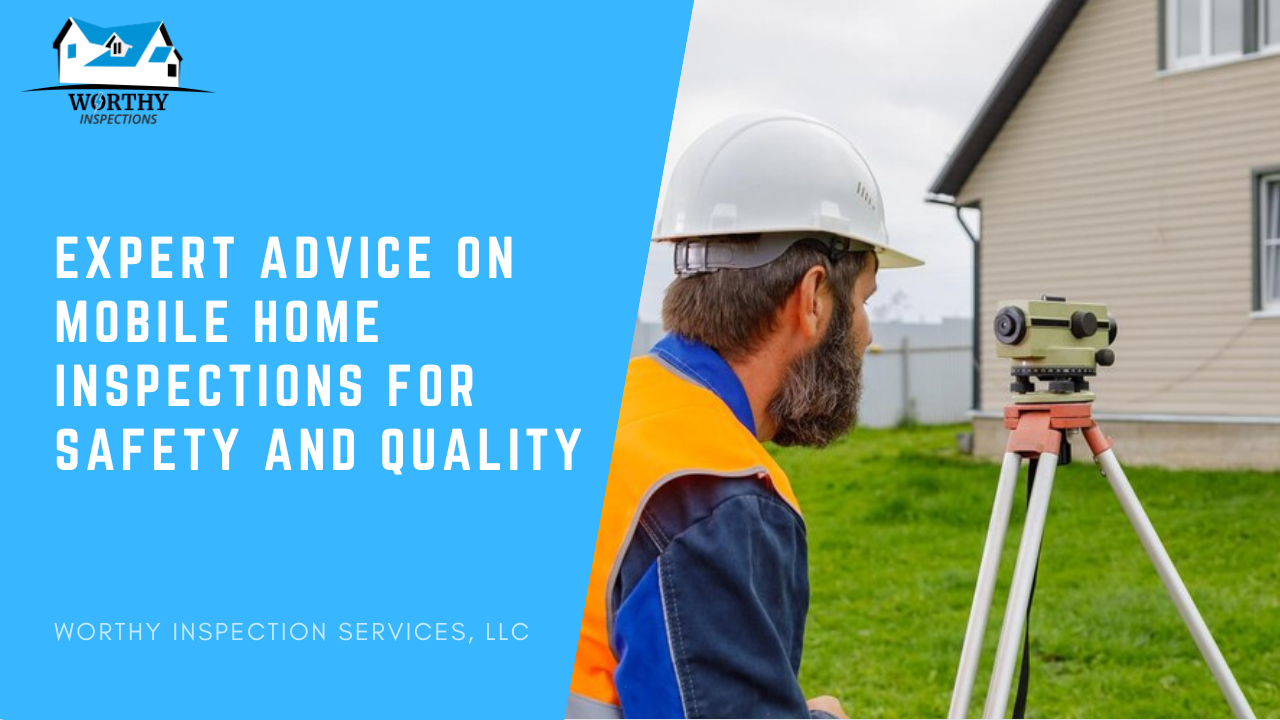The dream of homeownership can take many forms, and mobile homes offer an attractive and affordable option for many. According to federal data, an estimated 20 million people live in mobile homes across the country, making them a significant housing market segment. Mobile homes come in various styles and sizes, providing a comfortable and convenient living space. But just like any other home, mobile homes require proper inspection before you make a purchase.
Continue reading to learn everything you need to know about mobile home inspections, ensuring you invest in a safe and high-quality living environment.
What are Mobile Home Inspections?
Similar to traditional home inspections, mobile home inspections involve a qualified professional meticulously examining the property to identify any existing or potential problems. The inspector will assess the home's structural integrity, the functionality of major systems (electrical, plumbing, HVAC), and the overall condition of the foundation, roof, and exterior.
Why are they Necessary?
While mobile homes are built to specific federal safety standards (HUD Code), wear and tear, improper maintenance, and environmental factors can compromise a home's safety and functionality over time. An inspection uncovers these hidden problems, potentially saving you from costly repairs. Here are some key reasons why a mobile home inspection is essential:
- Peace of Mind: An inspection identifies potential problems before you finalize the purchase, allowing you to negotiate repairs or walk away if the issues are too significant.
- Safety Concerns: Mobile homes are susceptible to specific safety hazards, such as faulty electrical wiring, foundation problems, or roof leaks. An inspection identifies these issues, preventing potential dangers for you and your family.
- Accurate Valuation: The inspection report can highlight repairs needed, allowing you to factor those costs into your offer price. This ensures you pay a fair price for the mobile home.
- Bargaining Power: The inspection report becomes a valuable tool during negotiations. You can use the report to justify a lower purchase price if significant repairs are required.
When Should an Inspection Take Place?
Scheduling a mobile home inspection is crucial before finalizing the purchase of a home. Ideally, the inspection should occur after your offer has been accepted but before closing the deal. This timeline allows you to leverage the inspector's findings during negotiations or potentially walk away from the purchase if significant problems are discovered.
Mobile Home Inspection Checklist
A mobile home inspection checklist typically covers various aspects of the property, including:
- Structural Integrity: Checking for signs of sagging floors, roof damage, or wall cracks.
- Electrical Systems: Inspecting wiring, outlets, and circuit breakers for safety and compliance with building codes.
- Plumbing: Assessing the condition of pipes, drains, and water heaters to ensure proper functionality and leak prevention.
- HVAC Systems: Examining heating and cooling systems for efficiency, proper ventilation, and compliance with safety standards.
- Exterior Features: Inspecting siding, windows, doors, and skirting for damage or deterioration.
- Interior Components: Evaluating the condition of flooring, ceilings, walls, and appliances for signs of wear or malfunction.
- Safety Features: Checking smoke detectors, carbon monoxide detectors, and fire extinguishers for functionality and placement.
Key Points and Costs
The cost of a mobile home inspection varies depending on the size and location of the home. While it may seem like an additional expense, it's a wise investment compared to the potential cost of repairs for undetected problems. Here are some further points to remember:
- Be present during the inspection: This allows you to ask questions and gain a deeper understanding of the inspector's findings.
- Request a detailed report: The inspector should provide a written report outlining the home's condition, including photos of any identified issues.
- Feel free to negotiate: Use the inspection report as leverage to negotiate repairs or a lower purchase price.
Identifying a Reliable Mobile Home Inspector
When choosing a mobile home inspector, looking for someone with the right qualifications, experience, and reputation is essential. Here are a few tips to help you find a reliable inspector:
- Credentials: Ensure the inspector is licensed, certified, and adequately trained to conduct mobile home inspections.
- Experience: Look for inspectors with a proven track record of conducting thorough and unbiased inspections.
- References: Ask for references or check online reviews to gauge the inspector's reputation and customer satisfaction.
- Communication: Choose an inspector who communicates clearly and is willing to address any questions or concerns you may have throughout the inspection process.
Final Thoughts
Investing in a mobile home is an exciting step towards achieving your dream of homeownership. However, unlike traditional houses, mobile homes require a specialized inspection to ensure the property's stability, safety, and overall condition. By understanding the importance of a mobile home inspection, the key areas it covers, and how to find a qualified inspector, you'll be well-equipped to navigate the process confidently. Remember, a thorough inspection is a wise investment that can save you from costly repairs and potential safety hazards.
Ensure a Smooth Mobile Home Inspection with Worthy Inspections!
Are they buying a mobile home? Don't let unexpected repairs derail your dream. Worthy Inspections Services provides a thorough inspection, uncovering potential problems before they become costly surprises. Our experienced inspectors ensure a smooth buying process, giving you the confidence to move forward. Contact us today to book an appointment and ensure a stress-free buying experience.



Comments are closed